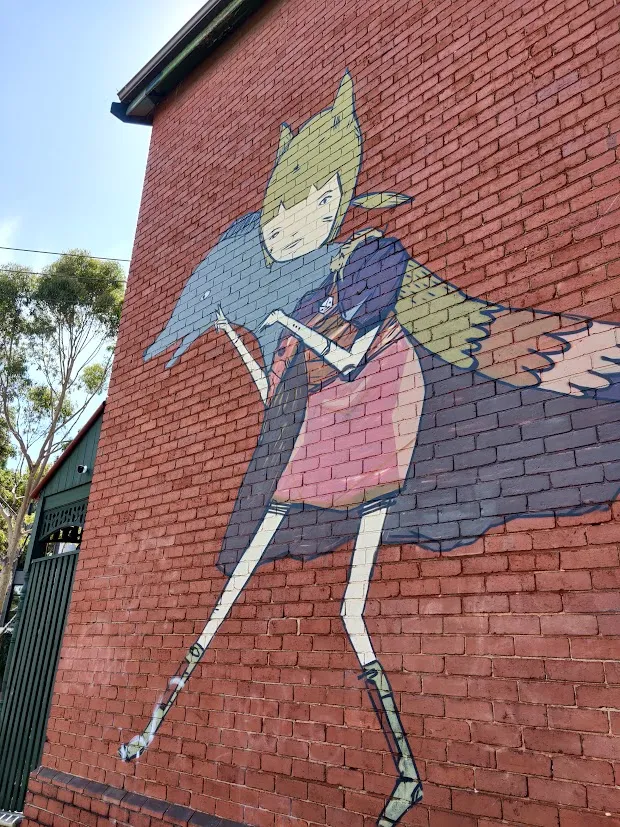A few years before COVID, I burnt out. It's common with high school teachers, overloaded with work and feeling pressure to get results, and the added politics (in my case, horrendous management and work place bullying) and admin required to perform the demanding job of educating teenagers. One morning, I woke up and simply could not get out of bed. My mind had broken. I couldn't string a sentence together. Work were helpful in getting me back on a reduced load until I was ready, gave me some time off, and even provided a counsellor (which was useless). Workplaces can be good when people break, but often do not provide the supportive environment in the first place that would retain good workplace morale and stronger retention rates of teachers - a huge problem in Australia right now.
I felt embarrassed about my collapse. In a culture that has traditionally suggested mental health is a fragility and a weakness, I had been maintaining the illusion of control to myself and others for years. One does not say no to increasingly workloads, especially if one is 'lucky enough' to have a good job and fears losing it. High performers are more likely to break, having high expectations of themselves (hands up, me) and add to that an 'always on' culture, poor management making jobs harder for the individual, and a whole range of personal stressors, I was bound to collapse eventually. It took years to feel okay about what happened. I felt like it took years to get my mojo back, and to be honest, I don't think it has ever come back.
Reflecting now on that time, I know I wasn't weak - I'd just been too strong for too long in a work culture that kept pushing and not supporting me in ways that would have made me even better than I was.
My personal experience of course colours any argument that suggests burnout is less about workload and more about personal mindset or personal failings.
Burnout is far more nuanced than that.
First of all, it's important to challenge the idea that burnout is about personal weakness. It's not 'the generation of today' and young people unable to rise to the challenge. It's not about people who fail to adapt or can't identify their own stress. There's decades of research in psychology and occupational health within organisations that suggests this argument doesn't hold up - burnout is a recognised occupational hazard, and nothing to do with weakness of the individual or a personal mental condition or problem. Arising from poorly managed chronic workplace stress that includes cynicism, reduced professional efficiency, and emotional exhaustion, it's more about ongoing and peristant pressure in the workplace, particularly those that expect or demand overwork and seem to set boundarires - even if underhand and subtle, like not allowing leave, or expecting one answer emails 24/7, or not allowing workers to go out to get lunch or coffee in town on their lunchbreak.
To say it's the worker's fault ignores the very definition of what burnout is.
To suggest people lean into burnout as an excuse for not handling work stressors is actually a really serious undermining of known consequences that come from the workplace and systemic issues within it.
It's also important to remember that 'percieved' and 'actual' workload is the same thing. In other words, the individual response to workload is valid. There's real research that shows that without solid resources to support the worker as well as the unsustainability of pointless, poorly managed and repetitive tasks (oh god, all of those pointless meetings that could be in emails!) or failing to set expectations (for example, you are not expected to answer emails between 5pm and 8 am).
I was a high performer that was dedicated to education - I felt passionate about it, I loved my career, and thrived off supporting students. No one praised me for that, but they certainly would jump in when their expecations weren't met. We had a principal who berated the entire English department for their results, not taking into account the general work ethic, learning difficulties and so on of the entire year level. Add to that constant reporting, frequent parent teacher interviews (little Johnny's Dad couldn't make the interview set aside for 3 pm Tuesday - could he book in for 5.30 pm on Friday?) and bullying within the department (underhand, gaslighting, and general bitchiness) and even the most steely of workers would be feeling the stress.

The idea that the worker fails because they have the inability to manage stress or cope with the work environment completely ignores individual diversity. People have different limits and abilities - that is not a failing. We're human, all with different genetics, life contexts, health status, trauma background, support systems. Workplaces are increasingly made to consider this by law - and are becoming more adaptive and flexible to maintain valuable diversity and retention in their institutions. People are not automatons. We are not numbers, or chattel, or slaves just because we recieved a paycheck. If employees expect unfailing uniform performance, they also fail to ignore that people also need a sense of purpose, safety, and rest to perfom well for the company.
It's really good to see that accomodations are made for people who might be struggling, because it shows that systemic systems are being modified and improved to support workers because that is good as a whole for the company. A happy worker is a good worker. Go research this. It's true.
I was also really irritated (to put it mildly) to read this comment this week. I've edited it slightly for readability and I don't want to personally attack the author, only the entrenched attitude:
I'd never heard the word 'burnout' from my father or in my own working life - it's a new thing from Gen X and Gen Z because of their lifestyle. Our elders lead a tougher life than them and they never complained and just did the job. The new generations have it easy and just want fun instead of responsiblity.
This suggests that people in the past were more noble, more heroic, stronger. What a load of bollocks. Workers in previous generations did burn out, but it wasn't named, and they certainly wouldn't have felt safe talking about their mental health. Tell me about the alcoholism, the life expectancy, the regret, the illness, the effect on families. Tell me about how truly happy they were, and whether you truly could know that.
And don't get me started on how hard I see Gen X'ers and Gen Y working.
We don't live in the past - the pace of change in working life is well documented. We now have digital overload, an always on culture, threats to our economic safety (especially with AI coming in hot). Then there's also remote work isolation, constant restructuring in workplaces, and the gig economy This is unprecendented and even your hard assed Grandfather and worked for forty years as an accountant in the same job and that fought two wars would be unable to handle it.
It's categorically daft to compare one generation to another.
@tarazkp's argument this week that support is strategic and necessary, however, is absolutely bang on. We absolutely need supportive work environments, but not because it's the worker's fault, but because toxic work environments exist. Companies that support their workers aren't indulging or molly coddling weaklings - they're being smart. Safe workplaces are investments - they help worker retention by building morale and they help people innovate and excel in jobs they feel good about.

The idea that people need to be tough and take a good hard look at themselves is ignorant. It ignores that we need support be resilient - it's not just flexing muscles and being tough in super hard work environments.
If I'd returned to the same conditions, I would have burn out again. Sadly nothing really changed in the workplace and it was me that was forced to go part time and then leave teaching altogether - which every person who knew me and knew what kind of teacher was thought was a loss to the profession. In fact, workplace bullying made my job worse, taking away a role that I'd been in for eight years and was excellent at and passionate and expert within, and giving it to the head of departments friend to 'ease their load' whilst at the same time making mine harder - all for taking owed long service leave.
You can't expect people to man up, skill up, courage up, resilience up in workplaces that don't look at their own structural issues. I felt like I was drowning and the school wouldn't switch the hose off.
I don't think it's useful to suggest that burnout is the workloads fault, but in the same breath say that people need to change themselves to deal with it, and then again say that people need a supportive environment. Which is it? If coaching and other strategies provided by the organisation prevent people burning out, then obviously it was the environment that was to blame in the first place.
I know it's because of what happened to me, and others I know (when you start these conversations, it's amazing how many people come out and say 'me too') that I feel so strongly about systemic change in workplaces, and even stronger about any comment that burnout is a character issue.
Of course we have to assess both the individual and the organistion - but we can't say that personal responsiblity is the only issue as that's it's utterly dismissive of the damage that can be caused by particular work systems that are poorly designed, unempathetic, and often brutal.
With Love,

Are you on HIVE yet? Earn for writing! Referral link for FREE account here